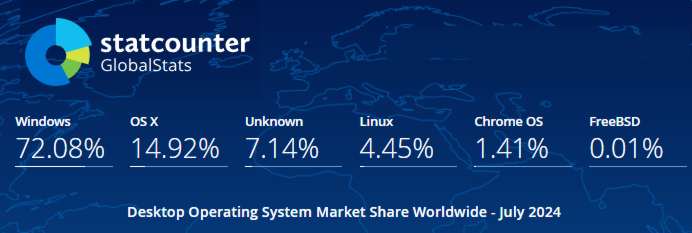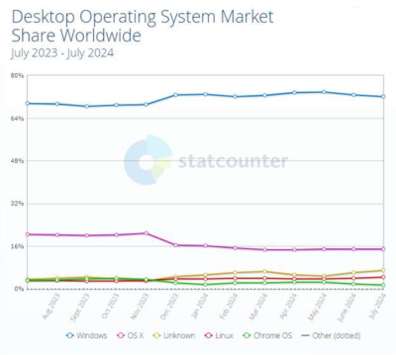| Linux At All-Time High, But Still Tiny On Desktop |
| Written by Harry Fairhead |
| Tuesday, 13 August 2024 |
|
Linux has increased its share of the worldwide desktop operating system market by almost half a percent in a single month, going from 4.05% in June to 4.45% in July. StatCounter is the source of these figures. This can to be seen as a substantial jump, given that in the period from June 2023 to June 2024, it had only put on just less than one percent. In my last report on Linux's increasing share of the desktop operating system market Is Linux On The Rise?, I speculated that its increase in popularity might be to do with the slow uptake of Windows 11 due to its hardware requirements. While Windows share had dropped to 68.15% in June 2023, it has now bounced back to 72.79% and this appears to be to the detriment of OS X which having been 21.38% in June 2023 is now 14.92%, a reduction of almost a third. Notice the sharp upturn in Windows' share between November and December and the corresponding downturn for OS X:
Linux has seen an increase of almost a half in the same time period and it too experienced the November-December effect when its share went from 3.22% to 3.82%, an even bigger rise than the most recent one. At the same two times that Linux's share increases, Chrome OS sees a marked decrease I've long been surprised that Linux, an open source operating system, continues to have such a small market share. But this is just on the desktop. On mobile Linux in the shape of Android dominates and then for microcontrollers there's Pi OS, again Linux. The problem with getting Linux the OS of choice for day-to-day personal and business use is the need to install it for yourself. Something the average user isn't likely to feel confident doing. Machines with Linux installed are still rare. Then there is the problem of choosing which distro, not to mention the need to choose the GUI. The Linux project gives us a standard kernel the core of the operating system, then the different distributions give us a far too large a range of possible installable systems. Linux doesn't complete with Windows or MacOS effectively because it is, on the desktop, hopelessly fragmented. If you are a Linux enthusiast you probably don't see this as a problem, but for the non-user it is confusing.
More InformationAndroid Becomes World's Most Popular OS To be informed about new articles on I Programmer, sign up for our weekly newsletter, subscribe to the RSS feed and follow us on Twitter, Facebook or Linkedin.
Comments
or email your comment to: comments@i-programmer.info
|
| Last Updated ( Wednesday, 04 September 2024 ) |





